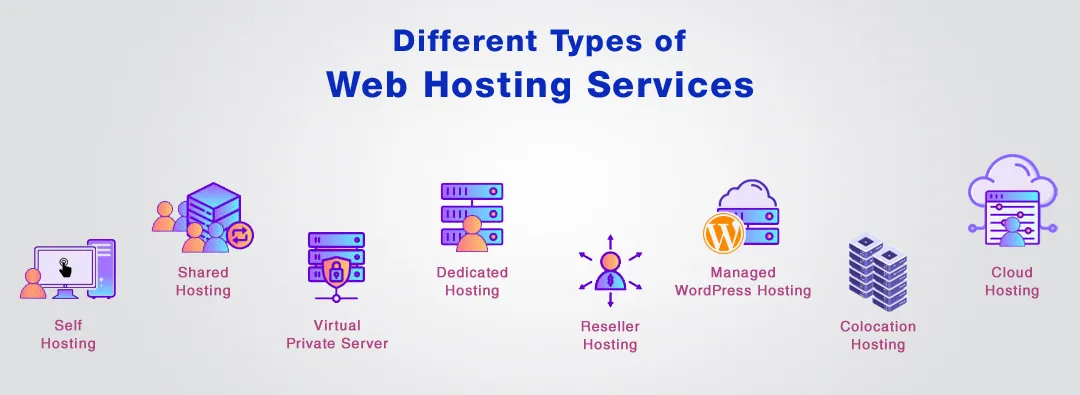Checking Out Different Kinds Of Web Hosting Services for Diverse Internet Site Demands
In today's electronic landscape, picking the proper host solution is important for straightening technological capacities with web site demands. Various options, such as common hosting, VPS, committed web servers, and cloud solutions, accommodate a spectrum of needs from personal blogs to complex venture applications. Each hosting kind provides unique benefits and limitations that can considerably influence cost-effectiveness, performance, and scalability. Understanding these subtleties is vital for making informed choices that align with certain company goals and goals, yet many customers stay unaware of the ramifications their choices may carry future development and functional performance.
Shared Holding Introduction
Shared organizing is a preferred internet hosting remedy that permits numerous websites to reside on a solitary server, sharing its resources such as transmission capacity and storage space. This sort of hosting is especially attracting people and small companies due to its cost-effectiveness. By merging resources, customers can gain from reduced prices contrasted to specialized hosting services where a solitary server is allocated to just one site.
In a shared holding setting, the web server's resources are divided among numerous users, which suggests that heavy web traffic on one website may impact the performance of others. However, many shared hosting carriers implement steps to take care of resource allotment effectively. This service typically consists of features such as email accounts, online documents monitoring, and one-click application installations, making it straightforward for those with limited technological experience.
Shared hosting is perfect for personal blog sites, local business internet sites, and profiles that do not anticipate high levels of web traffic. It is important to pick a credible holding provider to make sure reliable uptime and appropriate customer assistance. While shared hosting is a useful beginning point, customers need to monitor their website's development and efficiency to figure out if an upgrade to a more durable hosting solution may become essential.
VPS Hosting Explained
VPS hosting, or Virtual Private Server hosting, uses a substantial upgrade from shared hosting by providing individuals with committed resources on a virtualized web server. This design efficiently separates each customer's atmosphere, permitting higher modification, efficiency, and control. Unlike shared hosting, where resources are dispersed among multiple customers, VPS organizing assigns a details amount of CPU, RAM, and storage space per server, ensuring that performance is not impeded by bordering accounts.
VPS hosting is specifically beneficial for companies and internet sites that experience changing website traffic, as it can fit growth without the requirement for a complete overhaul of the organizing framework. Users can mount customized software program, configure web server settings, and handle security methods customized to their details demands.
In addition, VPS holding strikes an equilibrium between cost and efficiency - 10 Best Web Hosting Services. While it is normally much more costly than shared hosting, it is considerably a lot more inexpensive than dedicated servers, making it an ideal option for medium-sized business or programmers looking for reputable efficiency without too much expense. In general, VPS hosting acts as a robust solution for those calling for improved integrity, security, and scalability for their on the internet ventures
Committed Web Server Advantages
When taking into consideration the needs of a growing business, choosing for a devoted web server can considerably elevate performance and control. Dedicated servers provide an exclusive environment tailored to the specific requirements of a business, making sure optimum source appropriation without the interference of neighboring web sites. This isolation not only enhances rate and integrity yet likewise permits for constant efficiency, especially under high traffic problems.
An additional secret advantage of specialized hosting is the level of customization it uses. Services can configure their web servers to satisfy special specs, choosing the operating system, hardware, and software that best align with their operational requirements. This versatility fosters enhanced protection actions, as organizations can apply tailored safety and security protocols and firewall configurations to secure sensitive data.

Cloud Hosting Attributes
Cloud hosting deals a find out here now scalable and flexible service that matches the specialized web server atmosphere, dealing with services that need dynamic resource allocation and high schedule. Among the primary functions of cloud holding is its on-demand source provisioning, allowing services to scale their resources up or down based on real-time requirements. This flexibility makes sure that websites can manage differing traffic tons without performance deterioration.
Another substantial advantage is the redundancy and reliability offered by cloud architecture - 10 Best Web Hosting Services. Data is stored across several servers, making sure that if one server stops working, others can flawlessly take control of, decreasing downtime and improving customer experience. Additionally, cloud hosting normally consists of automatic backups, which safeguard information and help with recovery in case of unexpected incidents
Cost performance is one more noteworthy feature, as organizations only pay for the resources they utilize, staying clear of the prices connected with underused devoted web servers. Cloud hosting often comes with sophisticated security actions, consisting of file encryption and firewall softwares, to shield sensitive information from cyber hazards.
Choosing the Right Alternative
Picking the optimal host alternative needs a cautious analysis of different variables that align with a service's particular requirements and objectives. Secret factors to consider include the sort of website being organized, expected website traffic levels, and budget plan restraints. Little businesses with minimal web traffic might locate shared holding sufficient, while bigger enterprises or e-commerce websites may require dedicated or cloud holding for enhanced efficiency and safety and security.
In addition, the technical competence of the team is vital. Customers with very little technical understanding could profit from managed organizing services, which provide support and maintenance. Alternatively, tech-savvy groups might choose VPS or dedicated servers, enabling higher modification and control.

Final Thought
Shared holding offers well for low-traffic sites, while VPS organizing accommodates medium-sized enterprises with its personalized resources. Dedicated web servers supply optimum performance for high-demand applications, and cloud organizing offers unrivaled adaptability.
Shared holding is a prominent web hosting service that allows several websites to reside on a single server, sharing its sources such as transmission capacity and storage. While shared hosting is a practical starting point, users ought to check their web site's development and performance to determine if an upgrade to a more robust holding remedy might at some point be required.
VPS hosting, or Virtual Private Server hosting, provides a significant upgrade from shared hosting by giving users with committed resources on a virtualized web server. Unlike shared holding, where sources are distributed More Info among multiple users, VPS holding designates a certain quantity of CPU, RAM, and storage to each server, making sure that efficiency is not hindered by neighboring accounts.
Little services with limited web traffic might find shared holding sufficient, while bigger business or ecommerce sites might call for dedicated or cloud organizing see this here for enhanced efficiency and safety.